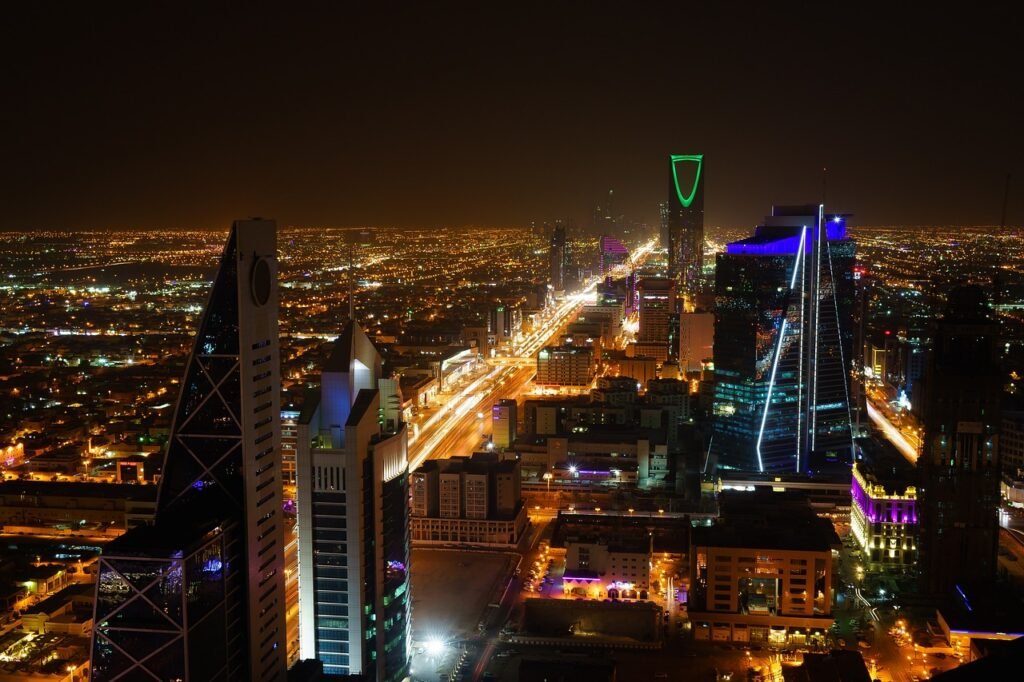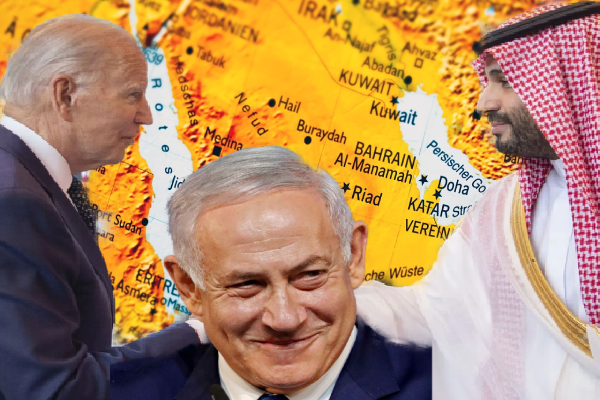The Israel-Hamas war in the Gaza Strip has been going on now for forty days, which has fetched lots of responses across the globe. The most vocal being the Muslim World in condemnation of Israel’s retaliatory actions in Gaza.
The de-facto leader of the Muslim World, Saudi Arabia has not taken any strong action against Israel apart from halting the in-process normalization of relations.
In this blog, we aim to unravel the complexities of Saudi Arabia’s stance on the Israel-Hamas war.
Table of Contents
History of Israel-Saudi Arabia Relations
Saudi Arabia never had any diplomatic relations with Israel. In 1947, when the United Nations held a voting for partition of Palestine land, Saudi Arabia voted against it.
During the Arab-Israel war of 1948, Saudi Arabia gave unwavering support to the Arab League against Israel, but Israel still managed to rise victorious by capturing 50% of the land of Arab states.
Therefore, Israel and Saudi Arabia never enjoyed friendly relations with each other when it came to the issue of Palestine. However, with the growing economic and military power of Israel and the thirst of Saudi Arabia to diversify its economy and to restrict the common enemy Iran’s support for terrorist organizations in the region, both countries started engaging with each other in terms of security and intelligence sharing.
In March 2023, Saudi Arabia and Israel took one step forward to start the normalization process. The USA played a significant role in bringing the two countries to the diplomatic table, Saudi Arabia accepted the rapprochement proposal in return for help from the USA on the civil nuclear program, security guarantees, and lessening limitations on US arms sales.
As of now, Saudi Arabia has halted the normalization process with Israel for its retaliatory attack on Hamas. Many geopolitical analysts held that the October 7 attack on Israel was carried out to derail the normalization process between Israel and Saudi Arabia.
profit over politics

The policy of Mohammad bin Salman (MBS) is to prioritize the economy over the traditional politics of Saudi Arabia. MBS introduced “Vision 2030” to the world, aiming to diversify Saudi Arabia’s economy and reduce dependence on oil exports.
MBS’s ambitious economic goals hinge on a stable Middle East and robust ties with the USA. Despite the ongoing conflict in Gaza, MBS proceeded with the annual Future Investment Initiative Conference, drawing participation from prominent financial figures worldwide. His intention is to present Saudi Arabia as a dependable economic partner rather than merely an oil exporter.
These efforts to position Saudi Arabia as a reliable economic partner were also evident during the recently held joint meeting between the Arab League and the Organisation of Islamic Cooperation (OIC) in Riyadh. The primary objective of the meeting was to advocate for freezing diplomatic relations with Israel, closing Arab airspace for Israeli flights, and imposing an economic embargo on Israel. However, Saudi Arabia and some other Arab countries opposed the proposal to sever all ties with Israel.
Deal With Israel is a Deal with the USA
The USA has got manipulative tool in the form of Israel in the region to contain the other powers in the region that do not toe its line. There are many examples that prove that having good relations with Israel directly means cordial relations with the USA.
- Israel-Egypt Peace Treaty (1979) – This deal opened the door to US foreign and military aid to Egypt.
- Israel-Jordan Peace Agreement (1994)- Jordan thereafter enjoyed friendly relations with the USA.
- Abraham Accord (2020) – This was a peace agreement signed by UAE, Bahrain, Morocco and Sudan with Israel. This agreement opened the door for the UAE to purchase F-35 fighter jets from the USA. The USA recognised Morocco’s annexation of the Western Sahara. The Status of Sudan as a state sponsor of terrorism was also lifted by the USA.
These examples provide incentives for Saudi Arabia to establish friendly relations with Israel as it would ensure a security guarantee and Saudi’s nuclear development with the help of the USA.
India-Middle East-Europe Economic Corridor (IMEC)
The IMEC project proposed during the recently held G20 Summit in India is an ambitious economic corridor that would connect India, UAE, Saudi Arabia, Jordan, Israel, and Europe.
The major portion of this corridor will pass through Saudi Arabia, which means Saudi would be the biggest beneficiary of this project. Economic corridors often encourage diversification by promoting various economic activities. If the project involves sectors beyond oil and gas, it could contribute to Saudi Arabia’s efforts to diversify its economy, in line with initiatives such as Vision 2030.
Participation in the project could lead to significant infrastructure development within Saudi Arabia, including the construction of roads, railways, and ports. This, in turn, can boost economic development and connectivity within the country.
Therefore, Saudi Arabia cannot miss this opportunity and the first step towards participation is to have normal relations with Israel as Israel is also an important part of the IMEC project. Though the normalization process has been halted by Saudi Arabia once the crisis in Gaza is over Saudi will actively engage with Israel in normalizing relations given the prize is Economic diversification.
Iran: The Common Enemy
Saudi Arabia and Israel have a common enemy in the region, which threatens the security of these countries through proxy wars. Iran funds Hezbollah in Lebanon and Hamas in Gaza which attacks Israel from time to time.
Iran funds and provides weapons to Houthi rebels in Yemen which had several times in the past attacked Saudi Arabia and its energy pipelines. According to the reports Iran has reached sufficient Uranium enrichment levels that can be used in making nuclear bombs, this is a serious threat to Saudi Arabia and Israel in the region.
The USA would also like to see good diplomatic relations between Israel and Saudi Arabia to resist Iran’s chaotic actions in the region that are not in the interests of Israel, Saudi, and the USA. Saudi is aware of geopolitical gains by having cordial relations with Israel. Iran is thus another valid reason as to why Saudi accepted to normalize relations with Israel.
Race to Become Leader of the Muslim World
Saudi Arabia is considered a de-facto leader of the Muslim World as it houses the two holiest Islamic cities, Mecca, and Medina, and due to its economic strength built on the export of oil. After MBS took charge of Saudi Arabia, it followed less radical fundamentalist policies and is now focused on building Saudi as an economic superpower. MBS knew once it became an economic superpower in the region it could reclaim its status of being the leader of the Muslim World but it won’t happen without the USA’s backing.
Taking advantage of this void space left by Saudia Arabia, Turkey with the aspiration of becoming the leader of the Muslim World is appealing to the Muslim World to stand against Israel. Turkey and Israel have recalled their respective ambassadors from each other’s countries. The Turkish parliament has banned Coke and Nestle from menus over their alleged support for Israel and Tukey even called Israel a terror state. The interesting fact is Turkey was the first Muslim country to recognize the independence of Israel. So, we can conclude that Turkey is trying to grab the opportunity to become the leader of the Muslim World.
Conclusion
The Kingdom’s focus on broader regional stability, coupled with its evolving relationships with both Israel and Palestinian factions, shapes its cautious stance.
As a silent spectator, Saudi Arabia navigates the complexities of Middle Eastern dynamics, prioritizing its national interests and strategic partnerships. The absence of a vocal stance allows the Kingdom to engage diplomatically and influence outcomes without risking destabilizing repercussions in an already volatile region.
